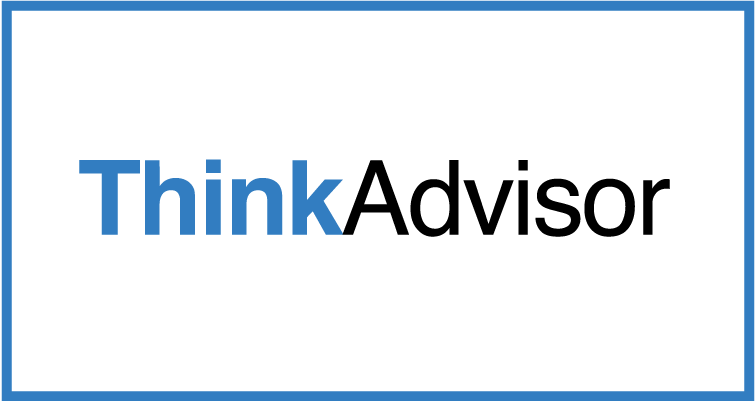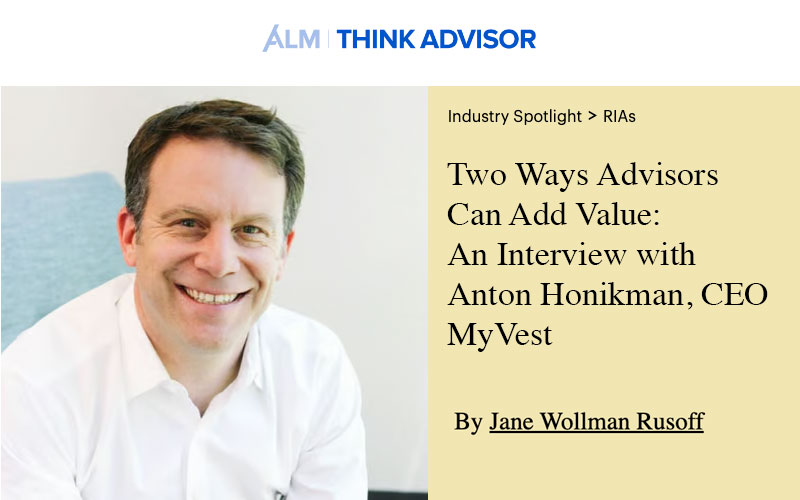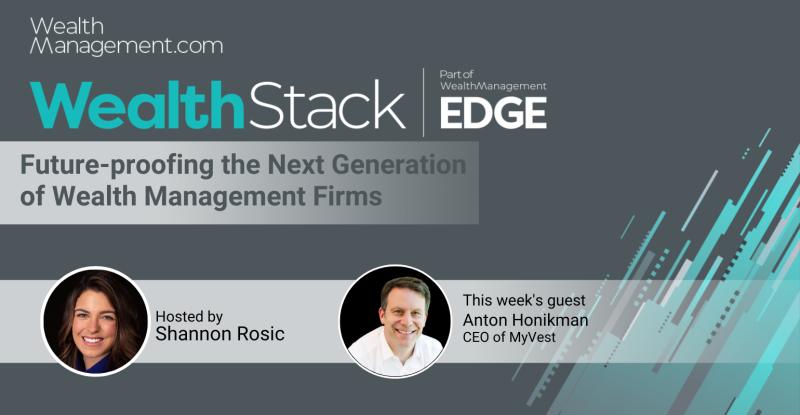This blog recaps a recent article published in ThinkAdvisor by John Manganaro | July 20, 2023
MyVest CEO Anton Honikman recently sat down with John Manganaro of Think Advisor for a Q&A interview covering how the bar has been raised for advisors competing in the marketplace today.
As Anton notes, a variety of factors make 2023 an “incredibly dynamic time” for the wealth management space and its practitioners, and firms who are willing to question older operating models in favor of emerging best practices will find success.
Recognizing and adapting to this shift will be critical to deliver the type of holistic value clients expect today. For advisors, this means being able to connect and support multiple facets of a client’s financial lives, whether it be retirement planning, tax mitigation, or creating estate plans.
The conversation with John was wide ranging, covering trends in tax management, the future of wealth management, and more. Below is an excerpt of their conversation.
Think Advisor: Why do you think tax management is gaining a more prominent role in the overall financial planning and portfolio management processes? How does this help improve client outcomes?
One of the main catalysts for broader adoption of tax management has been the growing availability of technology that can make the practice more comprehensive, systematically applied and scalable than one can achieve with hand-crafted portfolios.
More than just tax loss harvesting, comprehensive tax management can include asset location, smart gain deferral, best tax lot selection, household wash sale management, transition planning and more.
Think Advisor: Expanding on the prior question, do you expect more advisors and clients to utilize direct indexing capabilities as a means of achieving more tailored portfolios and greater tax efficiency at scale?
I expect direct indexing to continue growing, but likely at a slower rate than initial expectations, because exchange traded funds are a high quality, tax efficient and lower cost option for most accounts.
As direct indexing fees come down, that comparison hurdle is reduced. Further growth will be driven by expanding the use of portfolio management technology to enable a models-based approach to direct indexing as a sleeve of a broader multi-asset class solution.
ThinkAdvisor: With respect to the aggregator enterprises you serve, what are some of the biggest trends you see when it comes to the way advisors in the field coordinate with the home office leadership? Any common points of friction?
A critical issue to address here is the fragile alliance between acquired advisors who are accustomed to flexibility and independence, and their new home office, who will increasingly demand consistency and scale. Their incentives may not be 100% aligned.
Addressing challenges in a meaningful way must include the implementation of more automated, repeatable portfolio management processes that also give each firm and advisor the flexibility to tailor portfolios within centrally imposed parameters.
ThinkAdvisor: If you think ahead three or five years, what does the wealth management industry look like? Will there be more consolidation and greater competition among the leading providers?
There will definitely be more consolidation as thinner margins drive the need for scale. Given this consolidation, one of the biggest opportunities will be addressing the omni channel delivery of investment advice.
This situation raises the bar for holistic advice that includes all channels — self-directed, fully advised, hybrid robo-advice, workplace retirement accounts, insurance — and gives clients reporting, advice and ongoing management that encompasses their entire financial life.
Read the full article at ThinkAdvisor.com.


![How to unlock tax savings in incoming client portfolios [Financial Planning]](https://myvest.com/wp-content/uploads/Anton-FP-.png)
![The Holistic Impact of Wealth and Retirement Plan Advisory M&A [PlanAdvisor]](https://myvest.com/wp-content/uploads/Screenshot-2024-08-13-at-9.50.52 AM.png)

![Advisory Firms Work to Scale Rep-as-PM Programs [FundFire]](https://myvest.com/wp-content/uploads/FundFire-Interview.jpg)
